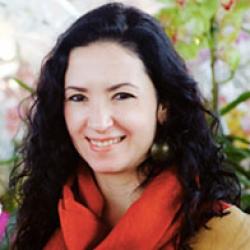Discovering Jain Philosophy with All Your Senses
Course Intro Video


Discovering Jain Philosophy with All Your Senses
Course 2006
Modern life’s formal education, Western religious and philosophical systems as well as medical and social sciences make us have the impression that our soul, mind and body work separately, do not quite affect each other, and that mind rules everything. In the popular imagination, philosophy and religion are the places for the mind whereas the gym or doctor’s office are the places for the body.
On the path to liberation, Jain dharma shows that soul, mind and body are integrated and that bodily conduct directly affects one’s incarnated spiritual journey. The field of the Anthropology of Senses, in its turn, has shown us that our engagement with specific material environments and practices – whether they are architectural aspects, icons, clothing, food, and other bodily aspects in daily life – shape our perceptions and conceptions about the world we live in, through processes of which we are not always aware, helping or preventing us from reaching true knowledge.
The combination of Jain philosophy, explanations, and practices within the framework of the Anthropology of Senses provides means for unveiling daily (perceived as natural) knowledge-obscuring practices, which lead us to distorted perceptions about life and what we are doing here. The course aims to lead participants to an auto-observation regarding how they learn what they learn by exploring how an Anthropology of the Senses both informs, and is informed by, Jain tradition.
 Jain Philosophy, History & Anthropology
Jain Philosophy, History & Anthropology
 Patricia Rodrigues de Souza, PhD
Patricia Rodrigues de Souza, PhD
On the path to liberation, Jain dharma shows that soul, mind and body are integrated and that bodily conduct directly affects one’s incarnated spiritual journey. The field of the Anthropology of Senses, in its turn, has shown us that our engagement with specific material environments and practices – whether they are architectural aspects, icons, clothing, food, and other bodily aspects in daily life – shape our perceptions and conceptions about the world we live in, through processes of which we are not always aware, helping or preventing us from reaching true knowledge.
The combination of Jain philosophy, explanations, and practices within the framework of the Anthropology of Senses provides means for unveiling daily (perceived as natural) knowledge-obscuring practices, which lead us to distorted perceptions about life and what we are doing here. The course aims to lead participants to an auto-observation regarding how they learn what they learn by exploring how an Anthropology of the Senses both informs, and is informed by, Jain tradition.
Learning Area
 Jain Philosophy, History & Anthropology
Jain Philosophy, History & Anthropology Instructor
 Patricia Rodrigues de Souza, PhD
Patricia Rodrigues de Souza, PhD
Patricia received her doctorate and master’s degree in Religious Studies from Pontifical Catholic University of Sao Paulo, Brazil, where she is currently a Professor of Religious Studies. Her dissertation was on Material Religion, a method to study religions from their empirical aspects, involving iconography, architecture, music, clothing, food and other bodily practices.
Her master’s degree’s research was about food practices and foodways in comparative religions. She is the author of the book Religion at the table. A sample of religions and their food practices, 2015 published in Portuguese, as well as of many other papers and book chapters.
Her master’s degree’s research was about food practices and foodways in comparative religions. She is the author of the book Religion at the table. A sample of religions and their food practices, 2015 published in Portuguese, as well as of many other papers and book chapters.
Enrollment Options
14-DAY FREE TRIAL
- Free, unlimited access to our self-paced courses for 14-days.
- Already used your free trial? Enroll in our Monthly or Annual Membership options at anytime and continue learning immediately!
MONTHLY MEMBERSHIP
- $45 USD / Month
- Immediate access to course #### | Name.
- Unlimited access to our live and self-paced courses for one month, with month-to-month auto rollover.
- Excludes graduate seminars and language courses.
